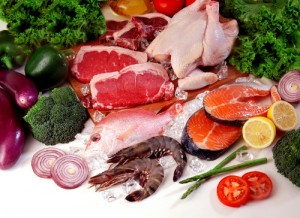The idea behind the Paleo Diet is to use foods in their natural forms, the way Nature intended them to be eaten. The basis is the diet of humans before we learned about agriculture and started building civilizations. In the period before the agricultural revolution, humans ate only what they could hunt and gather. Their diet consisted of red meat, fish, poultry, vegetables, fruits, nuts, and seeds. There was no pasta, no bread, no artificial sugars, no rice, no potatoes, no dairy, and no preservatives. These items are prohibited in the Paleo Diet, because they are believed to have detrimental effects on our health.
These foods are allowed:
Vegetables and Fruits
Eating vegetables is encouraged, especially the leafy and colorful variety. Legumes are discouraged because they can cause gastrointestinal problems. If legumes are to be eaten, they should be eaten raw. Potatoes and other starchy root crops such as cassava are not recommended because they are toxic when raw and have a high glycemic index. They also contain lectin, which blocks the absorption of nutrients into the body. Yams, on the other hand, are a recommended alternative food source because of their high nutritional value.
Fruits are recommended as well because they are a good source of nutrients, but have to be consumed sparingly because they are high in carbohydrates and fructose. Dried fruit and fruit juices have particularly high sugar contents. Those who are trying to lose weight are advised to avoid fruits altogether.
Meats and Eggs
Meats (including poultry, seafood, and organ meats) are the central components of the Paleo Diet. Our ancestors fed on wild birds, fish, and the occasional big game which comprised about 65% of their diet and provided essential fatty acids and proteins. But because the domesticated meats we eat today are far from the meats of wild animals hunted by our ancestors, the Paleo Diet recommends eating organic meats as much as possible. Ideally, chicken should be free-range, cows should be grass-fed instead of grain-fed (grains have the same effect on cows as on humans), and fish should be wild to avoid the toxic mercury levels of farmed fish.
Some Paleo Diet experts recommend low-fat meat sources, reasoning that the meats we commonly consume today are much higher in saturated fat (about 30% total fat) than the meats eaten by our ancestors, which only had 10% total fat and were mostly polyunsaturated.
Eggs are also a staple and are good sources of vitamins, minerals, and amino acids.
Nuts and Seeds
Except for legumes, peanuts, and cashews, nuts and seeds are allowed. Milk made from almonds and coconuts are often used as alternatives to cow’s milk. However, those who are weight-conscious are advised to limit their consumption of nuts and seeds to four ounces a day.
Oils and Beverages
The types of oils allowed in the Paleo Diet vary from expert to expert. Generally, olive oil, canola oil, and peanut oil are allowed. Some recommend coconut oil while some warn that consuming it in large amounts can be harmful. Fish oil is generally recommended as a dietary supplement.
Water is ideal and tea is allowed. Soda, coffee, and drinks with artificial sweeteners are not.